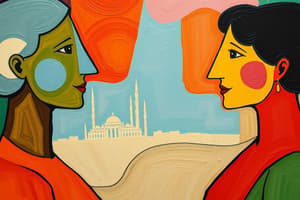Podcast
Questions and Answers
Define: Master status
Define: Master status
One status/role which overrides or overpowers your other roles.
Define: Gender Roles
Define: Gender Roles
Sets of behavioral norms assumed to accompany one's status as male or female.
Define: Role Conflict
Define: Role Conflict
Tension caused by the competing demands of two or more roles pertaining to different statuses.
Define: Status set
Define: Status set
What is the difference between an ascribed status and an achieved status? Give an example for each.
What is the difference between an ascribed status and an achieved status? Give an example for each.
What is the difference between role strain and role conflict?
What is the difference between role strain and role conflict?
In Role Theory, what is the example of Johnny not performing well on his midterm due to a basketball game?
In Role Theory, what is the example of Johnny not performing well on his midterm due to a basketball game?
What is a total institution? Give an example.
What is a total institution? Give an example.
What is the difference between resocialization and adult socialization?
What is the difference between resocialization and adult socialization?
Name four agents of socialization.
Name four agents of socialization.
What is the generalized other?
What is the generalized other?
What is the difference between I, me, and self?
What is the difference between I, me, and self?
Flashcards are hidden until you start studying
Study Notes
Key Concepts in Role Theory
-
Master Status: A primary role that significantly influences an individual's identity and behaviors, overshadowing other statuses they may hold.
-
Gender Roles: Behavioral expectations linked to being male or female, guiding actions and societal perceptions.
-
Role Conflict: This arises when an individual faces challenges due to competing roles across different statuses, such as balancing responsibilities as a student and an athlete.
-
Status Set: The collection of all statuses that an individual possesses at any given time, which can influence interactions and social identity.
Types of Status
-
Ascribed Status: A social position assigned at birth or involuntarily acquired, examples include race, age, and sex.
-
Achieved Status: A social position attained through individual effort and choices, such as being a doctor or an athlete.
Role Dynamics
-
Role Strain: The stress experienced when an individual struggles to fulfill multiple roles associated with a single status, leading to difficulties in management.
-
Role Conflict vs. Role Strain: Role conflict involves competing roles from different statuses (e.g., being a mother and a teacher), while role strain pertains to managing various roles stemming from one single status.
Total Institutions
- Total Institution: Environments where individuals are fully immersed, and all aspects of their daily lives are controlled, such as military boot camps or rehabilitation centers.
Socialization Processes
-
Resocialization: An intensive process that alters an individual’s social values and norms, often seen in transformative settings like prisons or during immigration.
-
Adult Socialization: Ongoing adjustment to new social environments and responsibilities, such as starting a new job or transitioning to different life stages.
Agents of Socialization
- Four Key Agents: Media, peers, schools, and family play crucial roles in shaping an individual’s social identity and norms.
Generalized Other
- Generalized Other: The internalized understanding of societal expectations that guides interactions with unfamiliar individuals.
Self, I, and Me
-
Self: The personal identity perceived by oneself.
-
I: Represents an individual’s sense of agency and capacity for action.
-
Me: Reflects how an individual believes they are perceived by others, indicative of social perspectives.
Studying That Suits You
Use AI to generate personalized quizzes and flashcards to suit your learning preferences.




